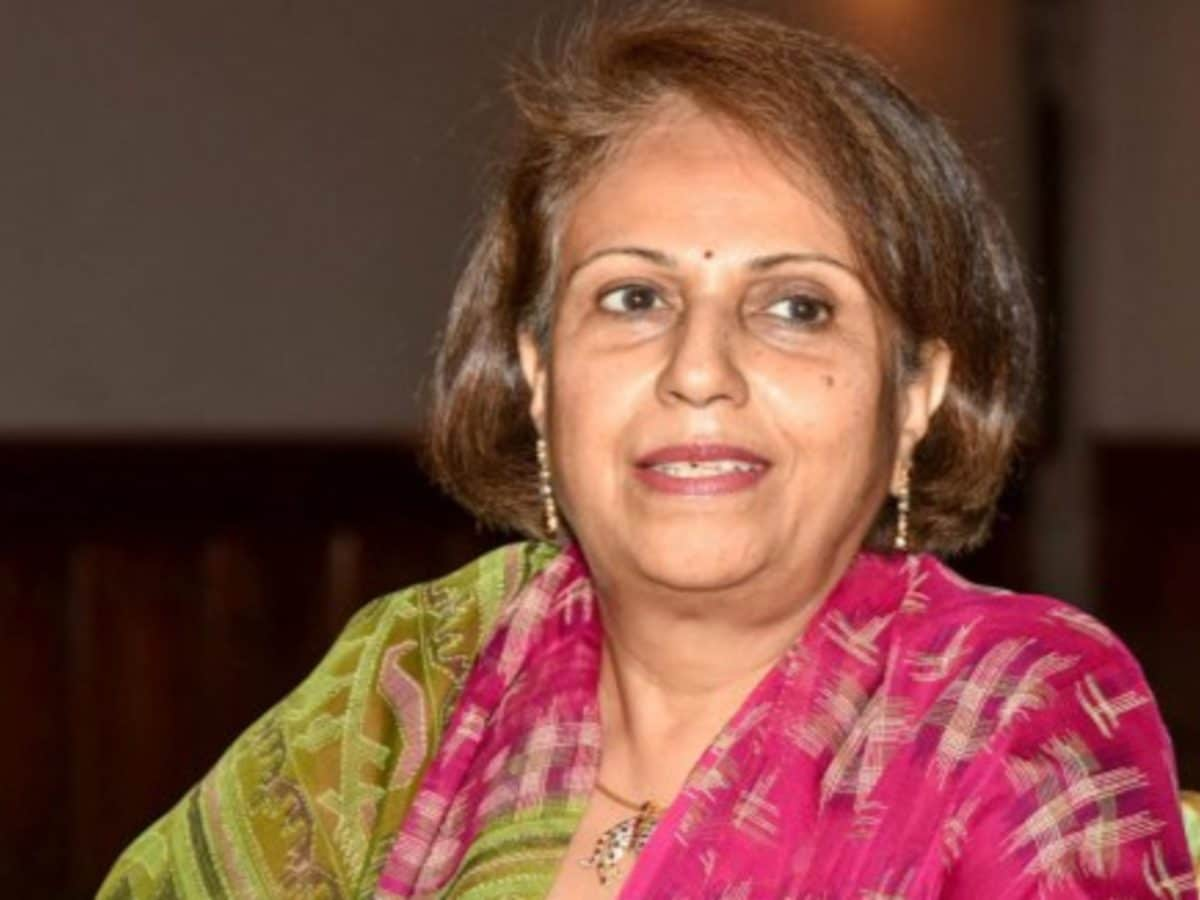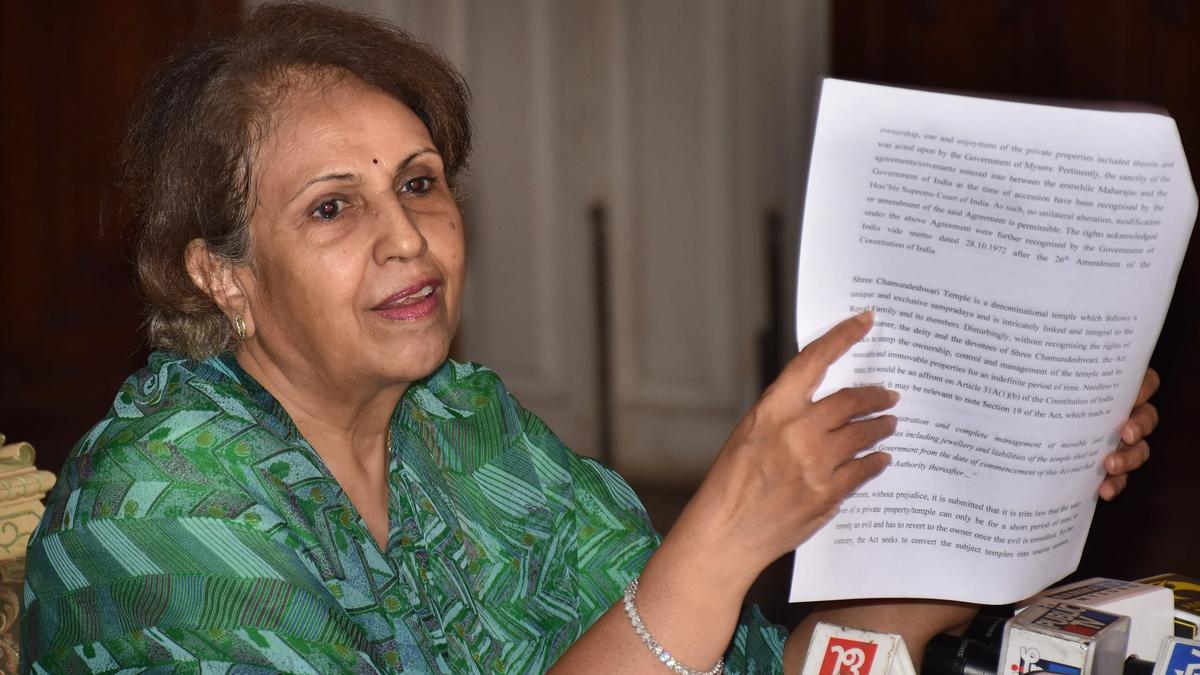Pramoda Devi Wadiyar, a prominent member of the Mysuru royal family, has sparked a major conversation by clarifying the distinction between the cultural and religious aspects of Karnataka’s iconic Dasara festival. Speaking to the media, she emphasized that while the Nada Habba, or state festival of Karnataka, is a grand cultural celebration involving people of all backgrounds, the Chamundeshwari temple and its associated rituals remain deeply rooted in Hindu tradition. Her statement comes at a time when questions have been raised about the festival’s inclusivity, symbolism, and representation in a modern, diverse society.
The Mysuru Dasara, often hailed as Karnataka’s cultural identity, has historically balanced royal traditions, religious rituals, and cultural inclusivity. By drawing a clear line between the secular and sacred dimensions, Pramoda Devi underscored the importance of preserving heritage without diluting its spiritual core. She reminded citizens that Dasara is a unifying celebration, bringing together music, dance, processions, and folk traditions that transcend religion. However, she also reiterated that the rituals at the Chamundeshwari temple cannot be stripped of their Hindu character, as they are integral to the spiritual foundation of the festival. Her words resonated with both cultural enthusiasts and devotees, sparking debates on secularism and tradition.
This clarification is particularly significant as Karnataka prepares for the grand Dasara festivities, drawing lakhs of visitors from across the globe. While the cultural extravaganza remains a matter of state pride, the Chamundeshwari temple rituals continue to anchor the festival in spiritual significance. Pramoda Devi’s statement is seen as both a defense of tradition and a reminder of cultural harmony. The balance she articulated between inclusivity and authenticity highlights the delicate fabric of Karnataka’s heritage and its continued relevance in the 21st century.
Heritage and Secular Identity of Nada Habba
The distinction Pramoda Devi made reflects a broader truth about Karnataka’s Dasara festival—its dual nature as both a cultural celebration and a religious observance. The Nada Habba has, over centuries, evolved into a secular identity marker for Karnataka, inviting participation from all communities regardless of faith. From grand processions showcasing folk dances, music concerts, tableaux, and wrestling competitions to public exhibitions and fairs, the celebrations have transcended narrow religious boundaries. This cultural canvas projects Karnataka as a land of diversity, inclusivity, and unity in heritage.
At the same time, the Chamundeshwari temple rituals remain at the heart of the festival, symbolizing the triumph of good over evil. For many devotees, offering prayers at the temple is not just a tradition but a spiritual obligation during Dasara. Pramoda Devi’s careful delineation ensures that the cultural essence of the Nada Habba is preserved while also respecting the deeply religious aspect of Chamundeshwari worship. In doing so, she addressed a critical concern—how to celebrate Karnataka’s shared heritage without erasing its sacred foundations. Her statement may set the tone for how the festival will be positioned in future years.
Dasara in Karnataka has always been more than just a festival; it is an expression of the state’s historical and cultural pride. The grandeur of the celebrations, marked by processions, tableaux, and artistic performances, serves as a reminder of Karnataka’s unique identity. Pramoda Devi’s clarification comes at a time when the festival’s essence is often debated in public discourse, where questions of secularism and inclusivity frequently arise. By stating that Nada Habba is cultural and Chamundeshwari temple is Hindu, she not only reinforced tradition but also safeguarded the inclusivity that makes the festival universally celebrated.
The statement also underscores the royal family’s continued role as custodians of heritage. Even though the Wadiyars no longer hold political authority, their presence and opinions still carry cultural weight. Pramoda Devi’s voice in defining the identity of the festival is taken seriously because the Mysuru royal family was instrumental in shaping Dasara into the spectacle it is today. Her stance bridges the past and present, ensuring that the festival remains authentic while adapting to changing social realities. This balance reflects the resilience of Karnataka’s traditions amid modernity.
Public sentiment across Mysuru and Karnataka shows a mixed but largely positive reaction to her remarks. Many cultural activists welcomed the clarity, pointing out that defining Dasara as cultural helps it remain a festival for all, while keeping Chamundeshwari temple practices religious preserves authenticity. On the other hand, some critics argued that the distinction may spark unnecessary divisions, as both dimensions are inherently intertwined. However, the majority opinion leans toward appreciation of her effort to avoid misinterpretations of Karnataka’s most important festival.

One of the main issues often raised in recent years is whether Dasara should be described primarily as a religious or cultural event. With lakhs of people, including tourists from outside the state and even abroad, flocking to Mysuru during the festivities, the festival is now a global showcase of Karnataka’s culture. Therefore, describing it solely as a religious celebration risks alienating non-Hindu audiences. Pramoda Devi’s explanation provides a balanced framework: the cultural elements belong to all, while the religious rituals remain sacred for devotees. This interpretation provides room for everyone to participate meaningfully.
Economically, Dasara is a massive event for Mysuru and Karnataka, bringing in tourism revenue and providing livelihoods for artisans, performers, hoteliers, and small vendors. Thus, protecting its inclusive cultural character is also an economic necessity. A festival that is perceived as exclusive could reduce participation and interest. Pramoda Devi’s words therefore serve not just as a cultural safeguard but as an economic reassurance that Dasara belongs to the people. The government too, by designating it a state festival, acknowledges this cultural and financial importance. Her remarks align with this larger vision.
The religious identity of Chamundeshwari temple, however, cannot be overlooked. For devotees, the goddess embodies divine protection and the triumph of good over evil. The temple rituals, particularly during Navaratri, hold deep spiritual significance and cannot be detached from their Hindu identity. Pramoda Devi’s insistence on respecting this sacred space reflects an awareness that cultural inclusivity cannot come at the cost of spiritual dilution. By keeping the temple’s sanctity intact, she ensures that the faith of devotees remains central even as the cultural festivities expand outward to include all communities.
Politically, her statement is being interpreted in different ways. Some parties are viewing it as a reinforcement of Karnataka’s secular spirit, while others see it as an assertion of Hindu identity. The timing, close to the start of Navaratri, makes it particularly impactful in shaping narratives around Karnataka’s cultural direction. Analysts believe that Pramoda Devi’s neutral and historically grounded stance may help prevent political polarization over the festival. Her words highlight the need to respect diversity without undermining religious traditions, a message that resonates beyond Mysuru.
Political and Social Reactions to the Statement
Pramoda Devi’s remarks have inevitably triggered political and social discussions across Karnataka. Some leaders welcomed her clarification, noting that it helps preserve both cultural inclusivity and religious authenticity. Others, however, cautioned that stressing religious identity within a public festival could risk alienating non-Hindu participants. Social groups and cultural organizations, on the other hand, largely supported her, pointing out that such a distinction is necessary to prevent confusion and safeguard tradition. Activists stressed that Karnataka must ensure Dasara continues to inspire unity while respecting its roots.
Observers say that the timing of her remarks—just before the peak of Dasara preparations—was significant. By drawing attention to the dual identity of the festival now, she has pre-empted possible controversies during the celebrations. As Karnataka’s biggest cultural festival approaches, her words serve as a guiding principle for balancing heritage and inclusivity. They also reaffirm the royal family’s continued influence in shaping the cultural narrative of Mysuru and Karnataka as a whole. Ultimately, Pramoda Devi’s stance is being hailed as both pragmatic and protective of Karnataka’s living traditions.
From a social perspective, Karnataka’s younger generation, especially students and youth organizations, have been actively discussing cultural identity. For them, the distinction between secular celebration and religious practice is crucial in shaping modern civic values. Many welcomed Pramoda Devi’s clarification as it helps them understand how traditions can coexist with inclusivity. It also strengthens civic pride in Karnataka’s heritage, encouraging greater participation in Dasara events. Her stance serves as a guide for future generations navigating the balance between faith and cultural expression.
The statement has also sparked discussions among cultural scholars and historians. Many argue that this separation of cultural and religious elements has always existed but needed to be articulated more clearly in today’s environment of heightened sensitivities. They note that the Wadiyars historically celebrated Dasara as a royal spectacle involving multiple communities, while also keeping temple rituals strictly within religious norms. Thus, Pramoda Devi’s remarks can be seen as a continuation of the Wadiyar legacy rather than a new interpretation. Historians emphasize that this balance is what has kept Dasara relevant for centuries.
Looking ahead, Pramoda Devi’s intervention may shape how Karnataka officially projects Dasara in the future. Tourism campaigns, cultural exhibitions, and government-organized events may now place greater emphasis on its identity as a people’s festival while respecting temple traditions. This distinction will help Karnataka position Dasara as both a global cultural attraction and a sacred religious celebration. Ultimately, her words serve as a reminder that heritage thrives when both inclusivity and authenticity are preserved together. The dual identity of Dasara, as cultural and religious, stands reaffirmed through her voice.
Follow: Karnataka Government
Also read: Home | Channel 6 Network – Latest News, Breaking Updates: Politics, Business, Tech & More


